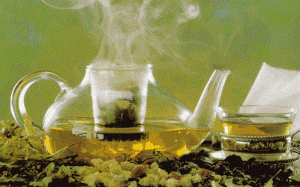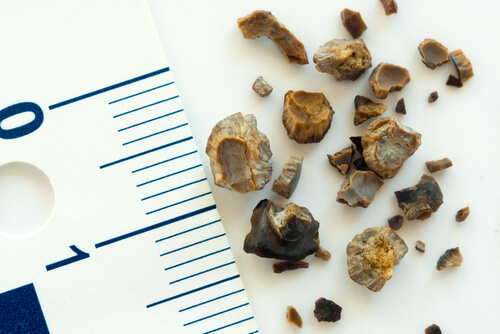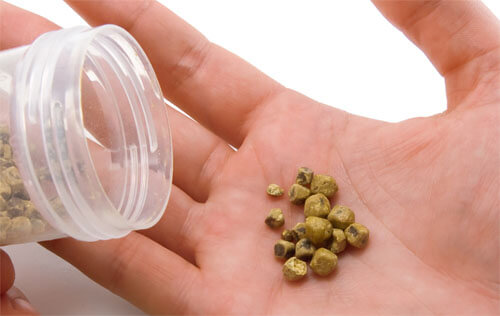Get Rid of Kidney Stones with Broadleaved Pepperweed

Broadleaved Pepperweed or Perennial Pepperweed is a wild herb that has been used for hundreds of years by different civilizations to dissolve kidney stones. In this article, you’ll learn how to dissolve kidney stones with Perennial Pepperweed as an ancient home remedy.
Broadleaved Pepperweed traits
This wild plant is able to grow in all types of soils at least 3000 meters above sea level. It’s abundant in forests or tropical areas like the Bahamas, the Amazons, South India, and China. This plant has been used for generations due to its ability to dissolve or remove kidney and bladder stones.
The plant normally grows no larger than 60 cm tall and the fruits are a mere 3 mm in diameter. Even though this plant it small, it has some incredible hidden properties. Broadleaved Pepperweed has a long history of being used in herbal medicine in South America and Asia.
Uses of Broadleaved Pepperweed
This plant could also be used for other uses besides treating kidney stones such as reducing liver disease (such as jaundice) and curing bacterial infections like cystitis or urinary tract infections. It can also be good for STDs, hepatitis, tuberculosis, colds and flu, and other viral diseases. Perennial Pepperweed can also reduce symptoms of diabetes, high blood pressure, and anemia.
Read this article too: Naturally Relieve Urinary Tract Infections in Children

This herb’s incredible powers have been studied by scientists all over the world. Traditional Chinese medicine recommends its use as a hepatoprotective agent, particularly for people who have hepatitis B or cirrhosis.
Broadleaved Pepperweed tea
You can consume Dried Broadleaved Pepperweed in a tea or infusion. Add 40 grams to a liter of boiling water, let it sit to cool and then strain out the liquid. The flavor can be somewhat bitter, so it’s a good idea to sweeten this tea with a little honey.
For treating kidney stones, you can drink three cups of Broadleaved Pepperweed tea a day for one month, even if the stones have already been passed. This is also good for patients that have bladder stones.
More benefits of the Broadleaved Pepperweed
Other than being used to get rid of kidney and bladder stones, this plant has several curative properties and it’s worth researching how its consumption can help reduce or cure several conditions and diseases.

The main advantage of the Broadleaved Pepperweed is that it can eliminate all kinds of obstructions that may form in the urinary tract by completely eradicating calcifications or stones. However, you can also use it for:
- Reduce inflammation and spasms
- Increase urination (recommended for people with kidney failure)
- Relieve all kinds of pain, especially in the lower abdomen (For example, women who are experiencing pain during their menstrual cycle)
- Reduce fever (but it’s adviced not to be given to children under five years old)
- Protect and purify the liver
- It has a mild laxative effect but is also a powerful diuretic
- Kill viruses and bacteria
- Eliminate intestinal worms
- Lower blood pressure, blood sugar, and blood cholesterol levels
- Aid in digestion.
Check out this article too: 6 Symptoms of Intestinal Worms
How to consume Broadleaved Pepperweed?
Depending on what you’re trying to treat, you have various options for taking advantage of this medicinal plant. The entire plant can be useful because its stems, flowers, roots, and fruits all have medicinal properties.
Besides treating urinary obstructions, this plant is good for the following:
- For certain types of cancer, you can slow the progression of the disease and help counteract the negative effects of chemotherapy. To do so, drink three cups of tea by infusing 40 grams of dried Broadleaved Pepperweed in a liter of water.
- When it comes to high cholesterol, make a tea by using the leaves and drink it twice a day.
- For people who experience colic, drink as much tea as you can of cook Broadleaved Pepperweed root every day you experience pain or discomfort. This treatment also good for people who have been diagnosed with liver disease.
- Diabetics should make a tea using the entire plant and drink it twice a day, first thing in the morning on an empty stomach and again at bedtime.
- For hepatitis, infuse 20 Broadleaved Pepperweed roots in two liters of water and boil them for half an hour. Afterward, let it cool to room temperature and drink every day until your skin no longer has a yellowish color.
- For patients with urinary infections, make a tea using the entire plant and drink three cups daily for four weeks. The same goes for people who have malaria, nephritis, and kidney stones.
- If you want to take advantage of this plant’s diuretic properties, make a tea using a handful of fresh leaves for every liter of water and drink a glass before every main meal.
- You can also use this plant externally if you’re experiencing inflammation of the eyes. In this case, the dried plant needs to be finely ground and mixed with five drops of essential oil, or castor oil. Place one drop in each eye in the morning and at night.
All cited sources were thoroughly reviewed by our team to ensure their quality, reliability, currency, and validity. The bibliography of this article was considered reliable and of academic or scientific accuracy.
- Azimkhanova B, Ustenova G, Sharipov K, Rakhimov K et al. Chemical Composition and Antimicrobial Activity of Subcritical CO2 Extract of Lepidium latifolium L. (Brassicaceae). Int J Biomater. 2021 Aug 4;2021:4389967.
- Lee N, Khoo W, Adnan M, Mahalingam T et al. The pharmacological potential of Phyllanthus niruri. J Pharm Pharmacol. 2016 Aug;68(8):953-69.
- Kaur N, Kaur B, Sirhindi G. Phytochemistry and Pharmacology of Phyllanthus niruri L.: A Review. Phytother Res. 2017 Jul;31(7):980-1004.
- Nishiura JL, Campos AH, Boim MA, Heilberg IP et al. Phyllanthus niruri normalizes elevated urinary calcium levels in calcium stone forming (CSF) patients. Urol Res. 2004 Oct;32(5):362-6.
- Navarro E, Alonso J, Rodriguez R, Trujillo J et al. Diuretic action of an aqueous extract of Lepidium latifolium L. J Ethnopharmacol. 1994 Jan;41(1-2):65-9.
- Micali S, Sighinolfi M, Celia A, De Stefani S et al. Can Phyllanthus niruri affect the efficacy of extracorporeal shock wave lithotripsy for renal stones? A randomized, prospective, long-term study. J Urol. 2006 Sep;176(3):1020-2.
- Murugaiyah V, Chan KL. Mechanisms of antihyperuricemic effect of Phyllanthus niruri and its lignan constituents. J Ethnopharmacol. 2009 Jul 15;124(2):233-9.
- Valido H, de la Trinidad I. Formation, transformation and inhibition of calcium oxalate nephroliths: in vitro studies and speciation by synchrotron radiation techniques. 2021.
This text is provided for informational purposes only and does not replace consultation with a professional. If in doubt, consult your specialist.








